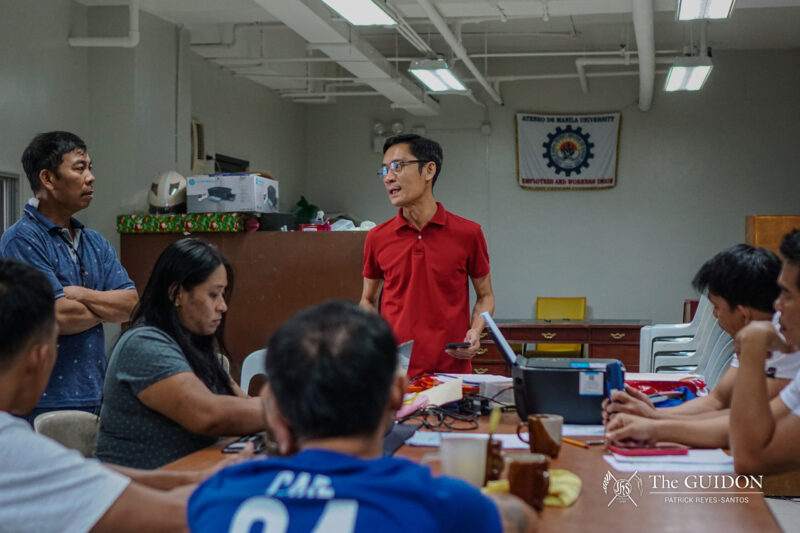“IT WAS a price shock.”
This is the reaction of University President Jose Ramon Villarin, SJ regarding the P4.15 price hike in the Manila Electric Company’s (Meralco) billing, which was approved by the Energy Regulatory Commission (ERC) on December 9, 2013.
Meralco said the price increase was caused by the maintenance shutdown of the Malampaya plant in Luzon from November 10 to December 11, 2013.
The Malampaya natural gas platform is Luzon’s major source of power. Without it, Meralco had to acquire electricity from the Wholesale Electricity Spot Market to meet the 2,700-megawatt deficit.
The only thing currently stopping Meralco from charging new rates is the temporary restraining order (TRO) issued by the Supreme Court (SC) on December 23, 2013. The 60-day TRO was set to lapse on February 21.
The SC has been asked to extend the TRO in an 11-page motion filed by Bayan Muna party-list representatives Neri Colmenares and Isagani Zarate. As of press time, however, the case is still pending.
According to John Gokongwei School of Management (JGSOM) Acting Dean Darwin Yu, PhD, the price hike was a record-high rate increase in Philippine history.
Yu believes the shutdowns are not “justifiable” vis-à-vis the price hike. He said the Department of Energy should have been informed of the scheduled maintenance shutdown so that the price increase would not have been as high as it is now. “That part is a puzzle to me,” he added.
Villarin further said, “The sooner this is resolved, the better [it is] for all of us.”
Economic impact
Some members of the Ateneo community said that, should the high electric power rates continue, the Philippines will experience economic repercussions.
Ateneo Economics Association Vice President for Academics Josef Villanueva said, “The reality is that another power crisis is looming in the face of the economic growth that we are experiencing.”
The Philippines reached a gross domestic product growth rate of 7.2% for 2013, which is above the government’s 6 to 7% target.
Villanueva explained that as more firms set up shop in the country, more electricity is required. The supply, however, cannot keep up with the demand. “This is because all firms use electricity in their operations; the cost for production will be high.”
“The consumers would be the ones to suffer ultimately. To some extent, small businesses that rely heavily on electricity would be forced to lower production level,” Villanueva said.
Meanwhile, Economics Department Associate Professor Aleta Domdom, PhD said that the electricity price hike could be a deterrent for foreign investors from setting up business in the country.
According to a 2012 study conducted by the Perth-based consulting firm International Energy Consultants, the rates in Luzon ranked ninth out of the 44 countries surveyed for having the highest electricity tariffs.
Feasible, long-term solutions
Several Ateneans agreed that a viable long-term solution for the electricity price hike crisis is developing the country’s power generation sector.
According to Villanueva, the price hike proves that the energy market in the Philippines is still underdeveloped and very few players are in the sector.
“If Meralco could get electricity from more plants, I doubt that we would be talking about this right now,” Villanueva said. “The country has a lot of access to renewable energy sources and I am baffled why we do not take advantage of this.”
Similarly, Domdom said that while the country may be using renewable energy like geothermal or wind, these are not enough to supply the country’s demand for electricity.
“For the long-term, the government should encourage and provide incentives for using renewable sources of energy to generate electricity,” she said.
Domdom believes that provisions are already stated in the Renewable Energy Act of 2008, which promotes the development, utilization and commercialization of renewable energy.
Meanwhile, JGSOM Acting Dean Yu said that the government should create a more “favorable investment climate” and a more “efficient market.”
“What we need is to create incentives for more power producers to enter the market, so we have less of these simultaneous shutdowns,” he said.
Villarin proposed several feasible long-term solutions: Developing a diversified set of energy sources, increasing energy efficiency, installing smart grids that connect Luzon, Visayas and Mindanao and focusing on renewable energy.
He added, “[We must] wean ourselves from the low-hanging-fruit, which is coal; create an energy think tank in academe with the private sector.”
Government action
Members of the Ateneo community said that the government should enforce measures to cushion the effects of the price rate hike.
Ateneo School of Government Dean Antonio La Viña said that if the SC decides to lift the TRO, the government needs to put measures into place to limit the impacts of the rate increase to consumers.
La Viña said that while Meralco has announced that it is willing to stagger the price increase over several months, “the SC should decide on this so we are well-guided in the future.”
Meanwhile, The Ateneo Assembly President Harvey Chua said that the natural expectation is to pressure President Benigno Aquino III to release an executive order to prevent the price hike.
“But that falls into the problematic problem-solving approach we have in the country—we depend too much on powerful people to stop harmful processes and decision from taking place,” he said.
According to Chua, the key is to build a coalition of media personalities, public figures and reform-minded politicians to call for more structural changes to bring about “more robust consumer protection.”
He explained that a swell of public pressure triggered by this issue could generate a lasting public policy arc that would right “what we feel is Meralco’s longstanding anti-consumer practices.”







